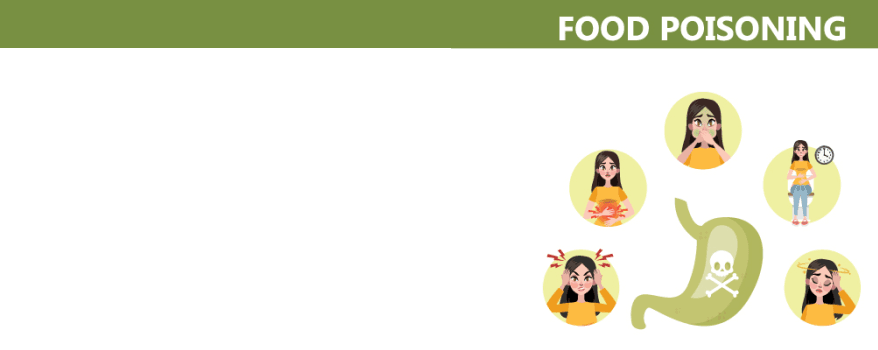
Food poisoning
What is food poisoning?
Food poisoning, also known as foodborne illness, occurs when you consume food contaminated with harmful microorganisms such as bacteria, fungi, parasites, or viruses. These microorganisms can produce toxins that lead to food poisoning. Upon ingesting contaminated food, your body reacts to eliminate the toxins, often resulting in symptoms like vomiting, diarrhoea, fever, or a combination. These unpleasant symptoms are your body's natural response to expel the harmful substances and return to a healthy state. Typically, the symptoms of food poisoning resolve within a day or two as your body successfully fights off the infection.
What are the causes of food poisoning?
Numerous harmful agents, known as contaminants, can potentially cause foodborne illnesses. Food or beverages that harbour these contaminants are deemed "contaminated." Contamination can arise from various sources, including:
- Bacteria.
- Viruses.
- Parasites are capable of residing in the intestines.
- Toxins or poisons.
- Bacteria capable of producing or transmitting toxins.
- Molds that produce toxins.
How does the food get contaminated?
Food contamination can occur at various stages, from the farm or fishery to the dining table. The contamination process may commence during cultivation, harvesting, or fishing and during processing, storage, transportation, or preparation.
Contamination can transpire anywhere the food is handled, including within households, owing to:
1. Inadequate hand hygiene: Failure to properly wash hands after using the restroom can result in faecal matter remaining on the hands, contaminating food. Additionally, other contaminants may be transferred from hands during food preparation or serving.
2. Lack of sanitation in cooking or dining areas: Failure to disinfect knives, cutting boards, or other kitchen utensils can lead to the spread of contaminants.
3. Improper storage practices: Food left at room temperature for extended periods can become contaminated. Similarly, food stored in the refrigerator for prolonged durations may spoil. Additionally, food stored in a refrigerator or freezer that is inadequately chilled can also spoil.
What are the risk factors of food poisoning?
Food poisoning can affect anyone, but certain individuals are at a higher risk of experiencing severe illness or complications. This includes:
- Infants and young children.
- Pregnant individuals.
- Elderly adults.
- Individuals with weakened immune systems, either due to underlying health conditions or medical treatments.
What are the symptoms of food poisoning?
If you suspect you have food poisoning, it's likely that you'll notice symptoms fairly quickly. The symptoms can vary depending on the source of the infection. In most cases of food poisoning, you may experience a combination of the following symptoms:
- Abdominal cramps
- Diarrhoea
- Nausea
- Vomiting
- Loss of appetite
- Mild fever
- Weakness
- Headache
However, in more severe cases of food poisoning, symptoms may include:
- diarrhoea persisting for more than three days
- Fever higher than 102°F (38.9°C)
- Difficulty seeing or speaking
- Signs of severe dehydration, such as dry mouth, reduced urine output, and difficulty keeping fluids down
- Blood in the urine
If you encounter any of these symptoms, it's crucial to contact a healthcare professional or seek medical attention promptly.
FAQS
Health In A Snap, Just One App.
KNOW MORE
